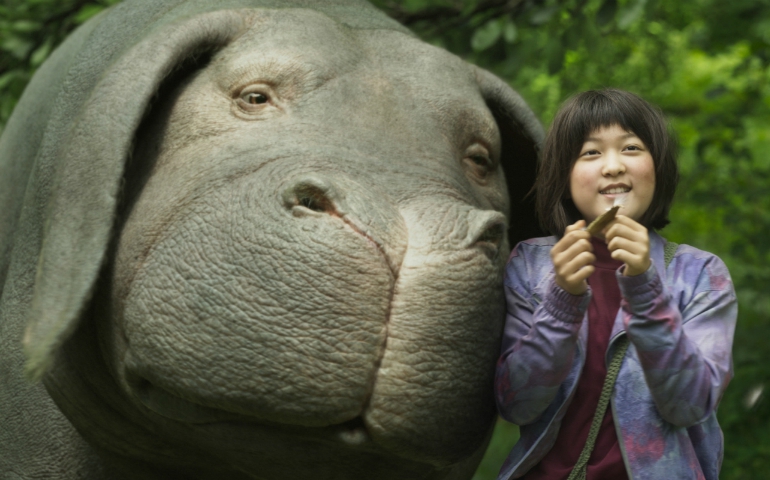
An Seo Hyun as Mija in "Okja" (Courtesy of Netflix)
If you introduce the genes of a hippopotamus and a St. Bernard into the genome of Babe (yes, of the "Pig in the City" fame), you just might get Okja, the super-sized pig in the eponymous new Netflix film directed by Korean filmmaker Bong Joon Ho.
"Okja" (2017) opens with much hype and fanfare. Literally. Lucy Mirando (Tilda Swinton), fireball CEO of a global corporation, plays host to a histrionic multimedia press launch to debut what she claims to be a non-genetically-modified "superpig" developed from a unique porcine individual discovered in some remote Chilean farm. The one pig is made to be the genetic begetter, by "non-forced, natural means," of 26 piglets, each to be raised by chosen farmers from around the world, after which the Mirando Corporation would be able to determine the best environment for the new designer pig.
Lucy banners her company's new core values — "environment and life" — and the promise of ending world hunger, while keeping the environmental footprint to a minimum and, most importantly, producing delicious meat.
Jump cut 10 years later to an isolated farm in a mountainous region of South Korea. A young orphan girl named Mija (An Seo Hyun) is going about her daily activities in the company of a winsome animal about the size of a hippo, which she and her farmer grandfather had named "Okja." Noticeably, Okja is behaving more like a pet dog than a free-range farm animal. The unlikely tandem performs chores together, picking fruit and catching fish (behemoth plunges into the stream, commensurate giant splash yields fish) for the evening's dinner.
At one point, Okja rescues Mija from plunging into a cliff, pulling her up as she dangles from a rope; at bedtime, the girl disappears in the embrace of the hulking pig who, like an oversized teddy bear, displays utmost gentleness.
But this is Okja, not Lassie. Mirando Corporation has adjudged the Korea-based superpig "Best in Show," and plans to fly her to New York for a grand King Kong-type reveal. The Teflon of goodwill flakes off, and the corporation's nefarious deception becomes apparent: Okja and her siblings, in fact, are all certified GMO.
With its mismatched-child-and-creature formula that we've seen many times before — see "The Black Stallion" (1979, "E.T. the Extraterrestrial" (1982), "Free Willy" (1992), among others — and some Disneyesque cuteness, it is easy to affix "Okja" with the stamp "children's fantasy." It is not. Neither is it a sloganeering anti-GMO exercise in filmic didacticism.
Korean filmmaker Bong, who has been noted for his deft handling of genre-busting material — his previous films "The Host" (2006) and "Snowpiercer" (2013) come to mind — adds one more entry to his edgy filmography. In "Okja," he works his usual mojo on the crisscrossing of themes and tones, so that dark comedy, action/adventure, social satire and feel-good drama all come together into one rollicking hybrid.
The film's inclusion at the Cannes Film Festival stirred controversy due to its straight-to-Netflix distribution, a guaranteed theatrical run being de rigueur in the prestigious film event. As it turned out, the polemic was not entirely warranted; there had been plans for a wide theater release in South Korea, not to mention limited screenings in the U.S. and Britain. Bong's bilingual film went on to receive a validation of sorts when the Cannes audience feted it with a four-minute standing ovation.
Standout performances include Korean actress An as Mija, who is an endearing blend of sweetness and plucky determination. Then there is Swinton and her bravura portrayal of Lucy Mirando (Swinton is also double-cast as Lucy's equally neurotic sister, Nancy). In the opening press conference, Swinton is a picture of inspired madness as she steps out in an aseptic white outfit, platinum blonde wig, and a mouthful of braces, and then delivers a green-washed speech to the tune of the Isley Brothers' socially conscious 1976 anthem "Harvest for the World."
Discordantly, Jake Gyllenhaal's Dr. Johnny Wilcox, an oddball, has-been TV zoologist hired to be the media face of Mirando, is a labored effort that too often feels like it. With Swinton's mania already at center stage, Gyllenhaal's flamboyant squealing becomes an unnecessary distraction.
The film's second half is set in New York City, where Mija and members of ALF (Animal Lovers Front) led by Jay (played by an on-point Paul Dano) are on a search-and-rescue mission for Okja. The raucous chase comes to a halt in the bowels of a meat-processing plant where the superpigs are lined up for slaughter.
Nightmarish in its cruelty, the scene has an unfortunate referent in actual commercial slaughterhouses, the shadow side of meat production and consumption that is relegated to a great forgetting, a sanitizing collective amnesia, if you will. Truth be told, we do not normally think of the crispy and delicious strips of bacon on our breakfast plates as the flesh of animals sacrificed at the altar of commercial greed. After "Okja," you might. I certainly have.
That said, an outright pro-vegan boycott of meat does not necessarily figure in the complicated morals of "Okja." After all, Mija and her grandfather are seen enjoying chicken stew at home. But the film does pose relevant ethical questions that may, at the very least, kindle a renewed appreciation for the godliness of sustainable farming, if not a more sympathetic understanding of the higher cost of organic food at the supermarket.
Which brings us to the irony of "Okja." For all its suspicion of the biotech industry, the film's story world presents us with this lovable, miraculous creature with a humanoid gaze to match her astonishing intelligence. Yet, she is thoroughly the genetically engineered offspring of the biotech industry. The strongest redemptive counternarrative of "Okja" is none other than Okja.
[Precious Blood Brother Antonio D. Sison is Associate Professor of Systematic Theology at Catholic Theological Union, Chicago, and author of the book The Sacred Foodways of Film (Pickwick, 2016). "Okja" is a Netflix exclusive that is currently available for streaming.]




